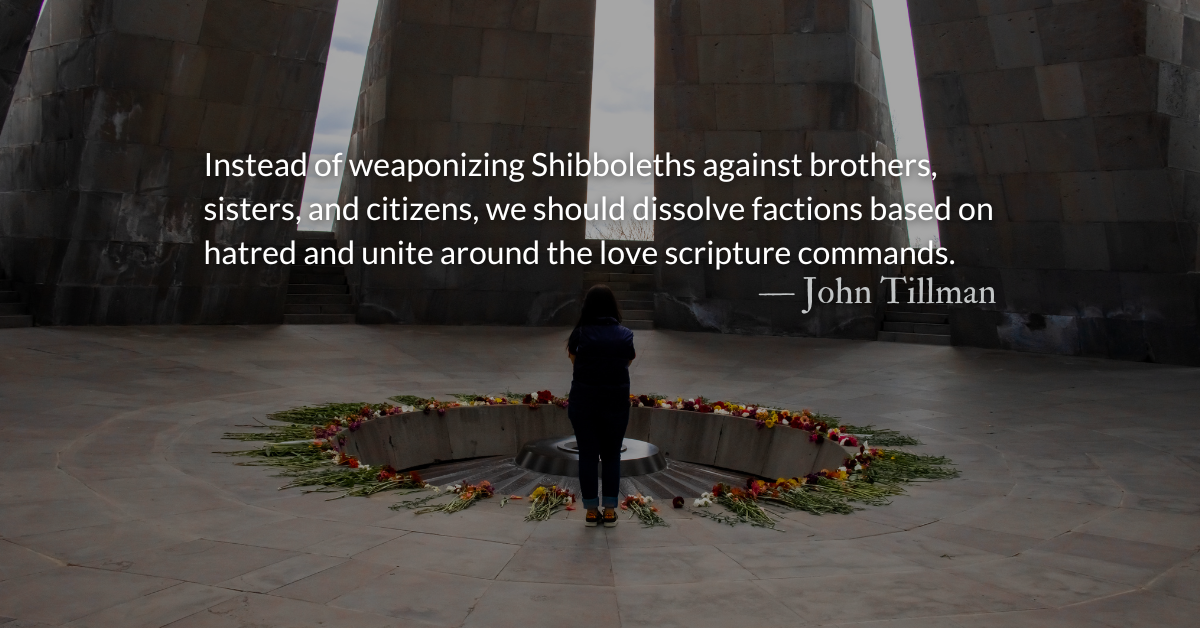Links for today’s readings:
Read: Judges 19 Listen: (4:52) Read: Hebrews 6 Listen: (2:58)
Scripture Focus: Judges 19.20b, 27-30
20b “Only don’t spend the night in the square.”
27 When her master got up in the morning and opened the door of the house and stepped out to continue on his way, there lay his concubine, fallen in the doorway of the house, with her hands on the threshold. 28 He said to her, “Get up; let’s go.” But there was no answer. Then the man put her on his donkey and set out for home. 29 When he reached home, he took a knife and cut up his concubine, limb by limb, into twelve parts and sent them into all the areas of Israel. 30 Everyone who saw it was saying to one another, “Such a thing has never been seen or done, not since the day the Israelites came up out of Egypt. Just imagine! We must do something! So speak up!”
Reflection: Facing Ugly Truths
By John Tillman
The final chapters of Judges are intended to shock readers. They succeed.
Like a character in the first reel of a horror film, the old man says, “Only don’t spend the night in the square.” This ominous foreshadowing is also connected to the past.
The only prophet in Judges is Deborah, however, the writers have a prophetic narrative voice. They expect readers to notice nearly word-for-word parallels between Sodom and Gibeah. Like Lot in Sodom, the old man in Gibeah insisted the travelers stay at his home. (Genesis 19.2-3) Why? Both men knew spending the night in the square was unsafe. Wickedness wasn’t a surprise—it was a normality.
The writers assume readers will notice the distance between what God commanded and what the people and leaders regularly did. This is true with judges, like Jephthah, who went from heroes to villains and it is especially true in the final chapters which have no judges at all—just people doing “as they saw fit.” (Judges 21.25)
If we look for heroes here, we won’t find them. Everyone is compromised and corrupted. Even the Levite (perhaps especially the Levite) turns our stomach. He sends his concubine out to rapists to spare himself, then goes to sleep in safety. The next morning, he expects her to get up and go with him, but she is dead on the doorstep. In the New Bible Commentary, Barry Webb says, “In retrospect we can understand very well why his concubine found it impossible to live with him.” Reconciling with this man led directly to her death.
The mutilation of the woman’s body, cut up and sent as evidence, offends many readers, yet is the least unjust thing done to her. The evidence of her abuse was an ugly, undeniable, inconvenient truth shoved in Israel’s face. There was no way to claim “fake news,” blame the data, or blame the victim. Confronted with the concubine’s story, Israel rightly said, “We must do something! So speak up!” (Judges 19.30)
When ugly truths that should shock us come to light today, how do we face them? Do we do something? Say something? Or do we deny the brutal evidence? Protect our own? Are we more offended at being shocked than inspired toward justice?
Further chapters reveal that Israel’s response was also a moral tragedy. May we respond with more wisdom, but may we always speak and act to bring justice to the vulnerable.
From John: This post is not specifically about sexual abuse. Any wickedness can be normalized and should be opposed. However, many survivors of sexual abuse and other forms of abuse have, through their repeated testimonies, had their bodies metaphorically cut into parts and sent out as evidence of their suffering. Too many times, tribes have not responded as Israel did. Too many times such evidence is denied or used against the victims, despite the emotional sacrifices and pain of sharing it. If you know someone who has experienced sexual abuse or are a victim and need assistance with counseling or reporting what has happened, contact RAINN (Rape, Abuse & Incest National Network). RAINN is the nation’s largest anti-sexual violence organization and operates the National Sexual Assault Hotline: 800.656.HOPE. There may also be excellent local organizations in your city or state.
Divine Hours Prayer: The Morning Psalm
Happy are they who have not walked in the counsel of the wicked, nor lingered in the way of sinners, nor sat in the seats of the scornful!
Their delight is in the law of the Lord, and they meditate on his law day and night.
They are like trees planted by streams of water, bearing fruit in due season, with leaves that do not wither; everything they do shall prosper.
It is not so with the wicked; they are like the chaff which the wind blows away.
Therefore, the wicked shall not stand upright when judgment comes, nor the sinner in the council of the righteous.
For the Lord knows the way of the righteous, but the way of the wicked is doomed.
— Psalm 1
– Divine Hours prayers from The Divine Hours: Prayers for Summer
by Phyllis Tickle
Read more: Ancient #MeToo Story
The next step must be to seek justice. The bold voice of Nathan was needed to bring the king to a place of repentance.
Read more: Woe to Abusers and Victimizers
Habakkuk describes the host of a party who betrays his neighbors by getting them drunk and then taking sexual advantage of them.






